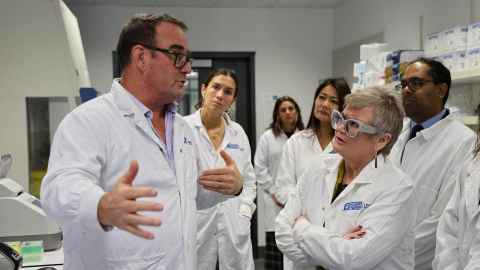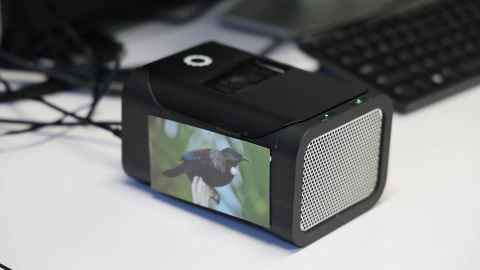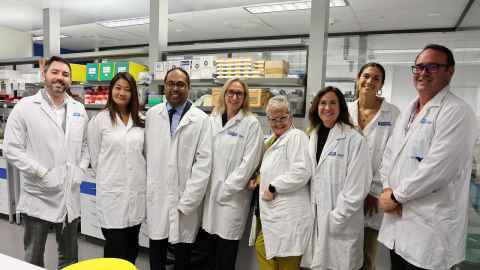Oxford-Auckland partnership delivers genomic ‘game changer’
15 June 2025
A Liggins Institute collaboration with an Oxford Uni spinout is paving the way for a nationwide rollout of DNA sequencing for very sick babies.

In November 2023, the first Oxford Nanopore Technologies genome sequencing machines were installed at the Liggins Institute’s Auckland laboratory.
Two black boxes, each about the size of a small loaf of bread, allow researchers to compare the DNA of very sick babies with that of their parents.
Doctors then use the information about genetic differences between parents and child to look for signals the babies have one of several hundred rare conditions, says Liggins Institute director Professor Justin O’Sullivan.
In a best-case scenario, doctors can use the sequencing data to gauge the right treatment for the baby, O’Sullivan says.
“In several cases we have diagnosed a baby with a rare disorder, and clinicians were able to quickly find a clinical pathway."

Even when there’s no treatment available, rapid diagnosis allows families and doctors to understand why a baby is so sick, and helps everyone make decisions about provision of care, he says.
For the last 18 months, the Liggins Institute has been working with the Oxford Nanopore machines and has also developed a partnership with Te Toka Tumai | Auckland City Hospital’s Genetic Health Service and medical laboratory LabPLUS, as well as the newborn intensive care unit (NICU) at Starship Hospital.
The collaboration has allowed doctors to map the DNA of 22 sick newborns and their parents.
“Now is the time to take the programme nationwide,” O’Sullivan says. “We now have proof of concept that the system works. We’ve done all the benchmarking and it’s ready to pick up and roll out into the labs across New Zealand that support our six NICUs – Auckland, Wellington, Tauranga, Hamilton, Christchurch and Dunedin.”
We can sequence a baby and their parents for less than the cost of a one-night stay in the NICU... Now is the time to take the programme nationwide.
Despite their name, ‘rare disorders’ aren’t all that rare. Because there are so many rare diseases, collectively they affect between 7 percent and 10 percent of the population, or up to 6000 of the approximately 60,000 births in New Zealand every year.
About 150,000 Kiwi children have rare disorders.
Oxford Nanopore Technologies, a spinout from Oxford University in the UK, produces a number of devices used to identify viruses and spot variants in the genetic makeup of humans.
It isn’t the only company making genome sequencing technology , but its machines are perfect for smaller populations like New Zealand, O’Sullivan says.
“They are easy to use, cheaper with smaller runs, and results can be turned around within 48-72 hours, with very detailed analysis.
“Liggins is a pioneer in using this Oxford Nanopore technology for a newborn genomics programme.”
O’Sullivan says expanding the DNA sequencing programme around the country could save money for the health system because faster diagnosis often means a shorter time in hospital.
“We can sequence a baby and their parents for less than the cost of a one-night stay in the NICU.”

“Game changer”
UK trade envoy to NZ MP Carolyn Harris visited the Liggins Institute on June 13 to see the sequencing machines in action – and talk with the clinicians treating babies diagnosed as part of the programme.
“I would like to see this rolled out across New Zealand, not just from a trade perspective, but from a health perspective. It’s a game changer,” she says.
“I don’t want to see anyone denied the equipment that is going to save lives.”
Media contact
Nikki Mandow | Research communications
M: 021 174 3142
E: nikki.mandow@auckland.ac.nz